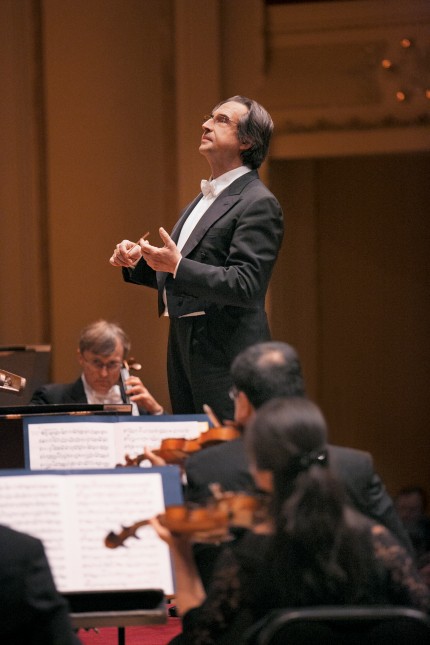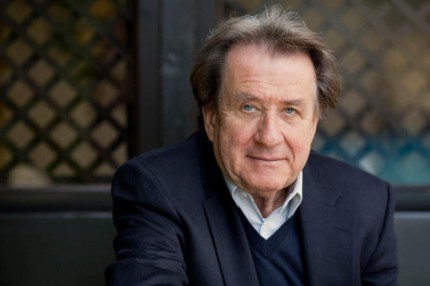Muti leads CSO in a grandly scaled and emotionally distant Mozart “Requiem”

It’s always a bit facile to impute external factors to a performance. Yet Thursday night it was hard to avoid the feeling that the frigid subzero temperatures outside Symphony Center had some effect on the cool and tempered music-making inside.
Riccardo Muti is back in town to lead the Chicago Symphony Orchestra for the next three weeks and led off with an all-Mozart program.
Mozart’s Requiem, famously left unfinished at his death, was the main work of the evening. The somber, valedictory quality of the composer’s dark and brooding final composition was made even more manifest by these performances being dedicated to Leonard Chausow, longtime assistant principal cello of the CSO, and Andrew Patner, critic-at-large for WFMT, both of whom passed away in recent weeks.
In addition to his memorable Verdi Requiem performances, the CSO’s music director has delivered some superb Mozart in recent seasons, so one had high hopes for his first local performance of Mozart’s K.626 swan song. Muti used the traditional Süssmayr completion as well as a now-untraditional full complement of the CSO Chorus. While grand in sonic scale, the chorus sounded top-heavy in this repertory, even with dexterous balancing.
Still, everything was technically in place, tempos well-judged and the orchestral playing as refined and responsive as one would expect, with standout turns by the basset horns of John Bruce Yeh and J. Lawrie Bloom, bassoonist William Buchman and a rich and rounded trombone solo from Michael Mulcahy in the “Tuba mirum.”
Yet the overall effect was of an emotionally cool and expressively straitened performance, lacking intensity, energy and an engagement with the spiritual drama of the mass setting. Everything emerged clearly and forcefully yet the roiling drama and interior introspection were only fitfully evident.
Saimir Pirgu’s vibrant tenor was the best of the solo quartet, which also included soprano Rosa Feola, bass Michele Pertusi and the unevenly projected mezzo-soprano, Alisa Kolosova. The soloists sounded similarly inhibited, and even looked uncomfortable, as if worried that too intensely dramatic an approach might elicit a raised eyebrow from the maestro.
The CSO Chorus, directed by Duain Wolfe, performed with customary polish and corporate cohesion, though here too there was little expressive warmth and too much generalized singing in ensemble passages. Perhaps the performance will fill out over the weekend, but Thursday night it felt very much like a firmly drawn outline of the score rather than a deep and probing account of the drama within.
The feeling of sobriety was set with one of Mozart’s only two piano concertos to be written in a minor key, No. 24 in C minor, K. 491.
The concerto–amazingly being heard downtown for the first time in a decade–is the most symphonic of Mozart’s keyboard concertos, and scored for the largest forces in the genre, including clarinets, oboes, trumpets and timpani.
In many respects, the concerto performance reflected the same positives and debits as that of the Requiem. Muti and the orchestra launched the opening movement’s stern principal theme with firm implacability, and soloist Rudolf Buchbinder proved a reliable nimble-fingered guide in this music, playing with admirable clarity of articulation and Classical restraint. The Viennese pianist-scholar seemed most in synch with the uneasy repose of the Larghetto, the searching wind lines nicely evoked, especially, by clarinetist Yeh and bassoonist Buchman.
Yet, as with his last CSO appearance in a Beethoven concerto two years ago, the overall effect was one of anonymous efficiency. In the outer movements, the performance could have used some of the individuality of the pianist’s cadenzas, Buchbinder’s playing lacking expressive detailing and dynamic nuance. Muti and the orchestra provided alert, high-gloss accompaniment, yet even in this distinguished company, the Allegretto finale emerged as decidedly prosaic.
The program will be repeated 1:30 p.m. Friday, 8 p.m. Saturday, and 7:30 p.m. Tuesday. cso.org; 312-294-3000.
Posted in Uncategorized





